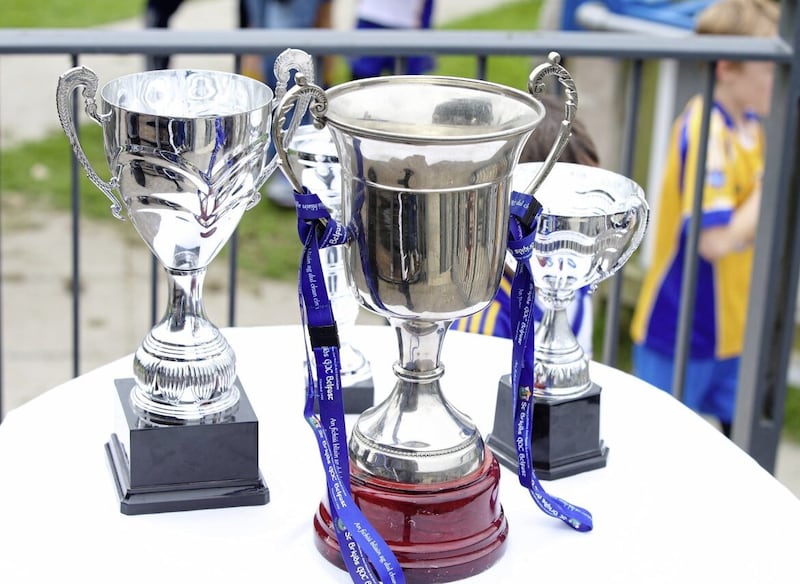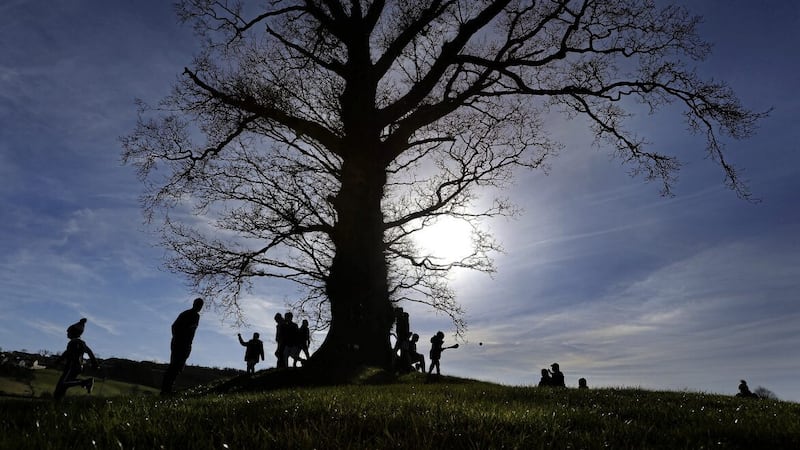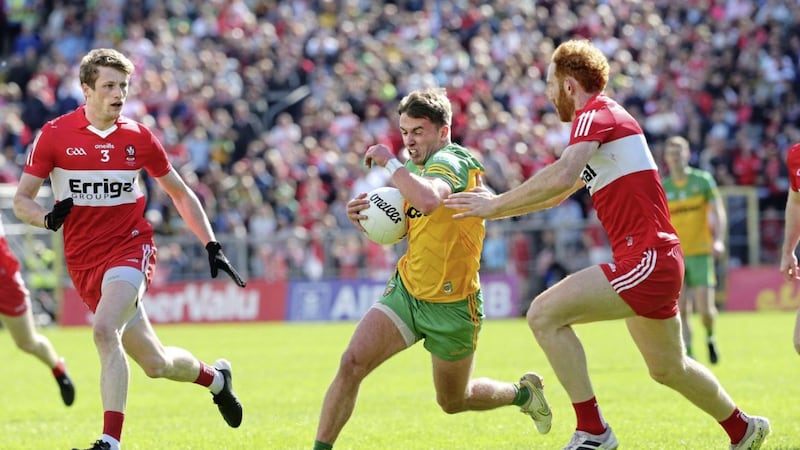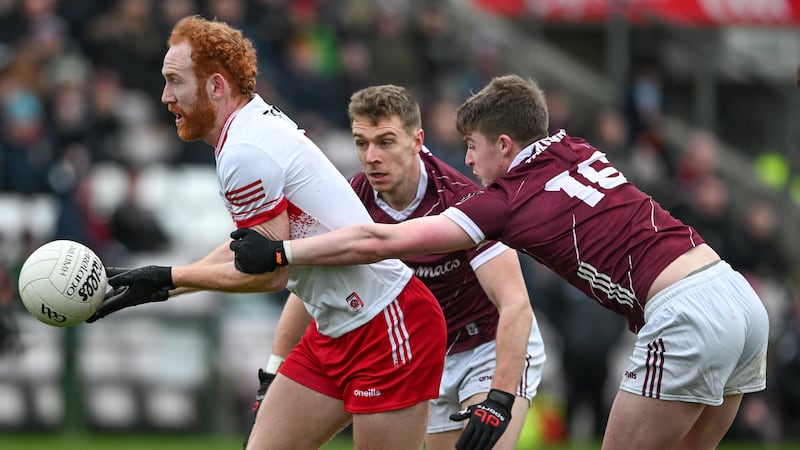OVER 40 primary school teams will descend on Watty Graham’s GAC later this month to take part in the long established and hugely popular St Patrick’s Maghera Castle Cup Primary Schools’ Football Festival.
In light of the GAA’s recent missive to its units around the country, there should be no scores kept between the ‘competing’ schools, no medals or trophies handed out and no winners and losers.
In other words, it would be a glorified GAA Go Games Day.
Of course, it’s doubtful Croke Park anticipated the high volume of polarising views on the back of its memo that was merely stating what was already in rule.
Things were perhaps getting out of hand in some parts of the country where there was a scathing disregard for the GAA’s playing philosophy for children under 12 involved in playing games.
In other words, the win-at-all-costs mentality was far too prevalent.
Paul Hughes has taught at St Patrick’s, Maghera College since 1985 and has helped continue the tradition of the famous Castle Cup, the brainchild of the great Adrian McGuckin.
“I would just fear that there is a pathway being lost because primary school is where the whole social element of sport starts, when it’s channelled by the primary school teachers,” said Mr Hughes.
“And what maybe people don’t understand is every day you take a school team out, it’s costing you £300 for a bus. And then will the school pay for another Go Games when the kids had Go Games last month? The school might ask: what’s the school getting out of this apart from a bit of participation?
“By contrast, when you have that bit of competition, there is maybe an added incentive for the school. I came to the school in 1985 and Adrian [McGuckin] already had it going at that stage.
“We’ve been fortunate that schools have bought into it and they enjoy it. What happens on Castle Cup Day is anybody who wants to participate, come and play and we’ll cater for whatever you have because there are A, B and C grades. Can girls play? Absolutely, girls can play...”
Hughes also feels that introducing children to competition after 12-years-of-age is the wrong juncture in their young lives.
“My wife, who is also a teacher, made the observation that you’d be introducing children to competition around about the same time they’d be going through puberty. That is a lot for them to contend with.
“So why delay? Why kick the can down the road? At the end of the day, there are only a few teams that can actually win things. Are we saying that winning is everything? No, we’re not.
“We’re saying that the journey is more important; the buzz that kids get from this. There are going to be winners and losers in every aspect of their lives – at sports day, Irish dancing and other games.”
He added: “When kids watch sport, what do they see? They see the effort, the energy, the passion, the adulation, the rewards, the hurt – they see all those things.”
In a recent social media poll, conducted by The Irish News, 66 percent of people were in favour of introducing children to a competitive environment before U12, while 34 per cent were against and therefore supportive of the GAA’s long-standing policy directive.
Shane Smith is a former Dublin footballer, a GAA coach and a schoolteacher in the capital who has a Masters in primary education.
A highly respected voice in how best to navigate the oft-times difficult area of coaching children in the most productive way possible, Smith is generally supportive of the GAA’s policy on non-competition for U12s.
Player drop-out across many sports falls off the cliff in the early teenage years, and Smith feels that the prevailing coaching philosophy in Ireland and the desire to win formal competitions at a young age is a significant contributory factor in the drop-out rate.
“I played a lot of sport when I was younger and I could see some of the pitfalls it had for young kids,” Smith said.
“I encountered many schoolteachers and coaches growing up who instilled a love of sports and saw at first hand them giving everybody equal opportunity.
“I became a schoolteacher and I always wanted to further my understanding of why children play sports. They play sports for different reasons: friendship, fun and to improve their skill sets.”
The Thomas Davis clubman coached his neighbouring Kilmacud Crokes to a county title in 2018.
He coaches several sporting disciplines at school and also camogie, football and hurling at juvenile level in his club.
“The GAA decided on this [policy] for a reason; that it has become too competitive somewhere along the line, but we’re not privy to that or how it happened,” the Dubliner said.
“The reason why the GAA Go Games were introduced was to eradicate the win-at-all costs mentality – to get good game-time, equal opportunity at their level. And I think, by and large, they’ve been a huge success.
“Sometimes we look at short-term gains rather than having a long-term vision. The short-term gain could be winning an U10 league or an U12 cup but at what expense?
“At the expense of having the same players as subs every week? At the expense of not giving equal game-time? At the expense of a child up to primary school age knowing they’re going to be a sub?
“Let’s look at eight or 10 years down the road and how do we retain as many children as possible in a positive environment? The only kid you can’t coach is the kid that’s not there.”
John McEntee, the former Crossmaglen and Armagh footballer, understands why the GAA has re-stated non-competition for U12s and sees it as a warning shot directed at coaches and clubs that have perhaps got carried away with wins rather than player development.
For McEntee, though, player development and competition for U12s can co-exist.
“There is something distinct about when you go out to play sport, you have the chance of winning,” McEntee said. “And if you don’t, it’s not the end of the world.
“I think we’re falling foul in society where you can’t do anything wrong, you’re not allowed to scold anybody because the way it might make them feel. But if there’s one space that you can have a child fail or not do well in, surely it must be a sporting field.
“You want the children to do their best and achieve their best, but if it’s not good enough on the day, the focus shouldn’t be on the win; it should be on how well they’ve done and how well they’ve progressed and the skills they displayed.
“You can’t play your best players all of the time, it’s about how a coach manages performance at underage level. Indeed, what the ethos of the club is.
“But children learn from losses. [In a non-competitive environment] You’re learning skills maybe, but you’re not learning things that are going to stand to you outside of the world of sport.”









